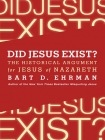Did Jesus Exist? - The Historical Argument for Jesus of Nazareth by Bart Ehrman (ebook reader browser .TXT) 📗

- Author: Bart Ehrman
Book online «Did Jesus Exist? - The Historical Argument for Jesus of Nazareth by Bart Ehrman (ebook reader browser .TXT) 📗». Author Bart Ehrman
My main objection to this line of argumentation, however, is the one with which I began. There certainly are similarities between what pagans were saying about their divine men and what Christians were saying about Jesus, as we have seen in the case of Apollonius. But the parallels are not as close and as precise as most mythicists claim. Nowhere near as close. True, some similarities are significant. But that is not relevant to the question of whether there really was a Jewish teacher Jesus who was crucified under Pontius Pilate. As we saw earlier with respect to parallels to Old Testament figures, when Christians told stories about Jesus, they shaped the stories in light of stories they already knew.
Jewish Christians in particular may have been inclined to portray Jesus in Old Testament terms. As soon as Christianity moved outside Judaism, however, and became a religion largely made up of converts from among the pagans, these new converts told stories about Jesus in terms that made sense to them. They increasingly shaped the stories so that Jesus looked more and more like the divine men commonly talked about in the Roman world, men who were supernaturally born because of the intervention of a god, who did miracles, who healed the sick and raised the dead, and who at the end ascended to heaven. If you wanted to describe a son of God to someone in the ancient world, these were the terms you used. You used the vocabulary and conceptions found in the idiom of the day. What other idiom could you use? It was the only language available to you.
The fact that Jesus was cast in the mold of pagan divine men does indeed create a difficult situation for historians who want to get beyond the idiom of the stories to the historical reality that lies behind them. But the mere fact that the idiom is being used does not mean that there is no reality there. The question of whether Jesus is portrayed as a Jewish prophet or as a pagan divine man is completely independent of the question of whether he existed.
Robert Price and the Mythic Hero Archetype
Robert Price in his recent book, The Christ-Myth Theory, uses parallels to pagan divine men in a more sophisticated way. Price argues that an ideal archetype of the “mythic hero” was “shared by cultures and religions worldwide and throughout history.”28 This ideal type comprises twenty-two characteristics, many of which apply to Jesus. Like many of these other figures from around the world, Jesus was made up according to type.
I do not need to belabor my criticism of this view since many of the points I made earlier apply here as well. I can say, though, that when social scientists talk about an “ideal type,” they are not referring to an actually existing entity but to a scholarly construct that is useful for classifying phenomena. Anyone who is “true to type” is not necessarily “made up” to fit the type. This is significant because some of the figures that Price uses to establish the type were certainly actual persons, such as the famous Peregrinus discussed by the ancient author Lucian of Samosata (as Price admits in Chapter 2: Eyewitness Accounts?). Jesus too could be true to type and be a real person. Here again, then, we need to differentiate between two questions: (a) How was Jesus talked about and portrayed by his later followers, and (b) did he really exist as a historical figure?
Price knows that these are separate questions, and he anticipates the objection by claiming that unlike other figures who really lived, such as Peregrinus, with Jesus we have no “neutral” information about his life. In Price’s view, “Every detail [of the Gospel stories] corresponds to the interest of mythology and epic.” And so the whole thing looks like it is made up.
This is another place where I seriously part company with Price. It simply is not true that all the stories in the Gospels, and all the details of stories, promote the mythological interests of the early Christians. The claim that Jesus had brothers named James, Joses, Judas, and Simon, along with several sisters, is scarcely a mythological motif; neither is the statement that he came from the tiny hamlet of Nazareth or that he often talked about seeds.
Price goes on to say that one other thing that makes historical figures stand out from those who are completely true to type is that they have left a “footprint on…profane history.” That is, we have records of Caesar Augustus and Apollonius of Tyana, who are mentioned in other (profane) sources.
The first thing to stress by way of response is that it really is not fair to use Caesar Augustus as the criterion by which we evaluate whether one of the other sixty million people of his day actually existed. If I wanted to prove that my former colleague Jim Sanford really existed, I would not do so by comparing his press coverage to that of Ronald Reagan. Moreover, in the ancient context I do not even know what the term profane (as opposed to sacred) is supposed to mean. The ancient world did not divide the sacred from the profane or even imagine these as discrete categories. And even if they had, why would a profane historical source be more valuable than a nonprofane one (whatever that is)? And which of the two is Philostratus, our chief source of information about Apollonius? Philostratus clearly sees Apollonius as an important religious figure, and he holds deep religious convictions about him. Does that mean Philostratus is not a valuable source? The same could be said about many of the sources for Augustus, who was widely seen as a superhuman being who eventually came to be deified.
Here again, however, my biggest problem with





Comments (0)